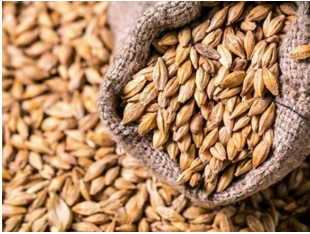INP-WealthPk
Muhammad Luqman
With the wheat sowing season in Punjab just around the corner, the Punjab Seed Corporation (PSC) has finalised arrangements for the provision of high-quality, certified wheat seed to growers across the province.

“PSC will supply 418,000 bags of over 10 progressive new wheat varieties during the upcoming sowing season, expected to begin within a couple of weeks,” said Shahid Qadir, Director of PSC. Talking to Wealth Pakistan, he said that the price of each wheat seed bag has been reduced from Rs6,500 to Rs5,500 to provide relief to farmers who suffered losses due to floods.
The varieties of certified seed being provided this year include: Akbar-2019, Dilkash-2020, Fakhar-e-Bhakkar, Aruj-2022, Nishan, Pakistan-2013, Faisalabad-2008, MH-2021, MA-2021, Subhani-2020, and Wafaq-2023. PSC, Shahid explained, operates four main seed processing plants in Khanewal, Sahiwal, Rahim Yar Khan, and Piplan, along with two mini plants. Together, these facilities have a total annual processing capacity of 90,000 metric tonnes.
To ensure a smooth and timely supply of certified seed in every district, PSC has established 17 sales centres across Punjab, located in Sahiwal, Bahawalnagar, Khanewal, Bahawalpur, Vehari, Dera Ghazi Khan, Multan, Rahim Yar Khan, Piplan, Layyah, Bhakkar, Sargodha, Jhang, Faisalabad, Gujranwala, Fateh Jang, and Lahore. In addition, 2,100 registered seed dealers are working with PSC to make the certified seed easily accessible to farmers.
Wheat sowing in Punjab typically takes place during November, with the optimal sowing window from November 1 to 20. In barani (rain-fed) areas, sowing may start earlier by the third week of October and continue into December under late-sown conditions. However, farmers’ associations remain concerned about the limited availability of certified seed. Punjab’s total wheat seed requirement stands at 1.1 million tonnes, while the available certified seed meets only about 30% of that demand.
“In the absence of adequate certified seed, most farmers use their previous year’s produce as seed — around 74% of the total requirement,” said Khalid Mahmood Khokhar, Chairman of Pakistan Kissan Ittehad (PKI). Talking to Wealth Pakistan, he said, due to this reliance on farm-saved seed, the annual wheat seed replacement rate remains at only 26%.
Khokhar urged the government to enhance the availability of quality-certified seed to improve productivity and ensure food security. Farmers’ representatives believe that better returns from wheat production would motivate growers to adopt certified seed more widely.
“Given last year’s disappointing experience, farmers are reluctant to spend heavily on inputs like seed,” said Ebadur Rehman, Director of Farmers Associates Pakistan. He warned that sowing non-certified seed could lead to a decline of at least 10% in overall wheat production. He emphasised that certified seeds are usually disease-resistant and climate-resilient, making them essential under changing environmental conditions in Punjab.
Rehman added that the government’s recent announcement of Rs3,500 per 40 kilogrammes as the wheat procurement price could boost grower confidence. “To capitalise on the positive sentiment among farmers, the government should take steps to increase the availability of certified seed,” he said, adding that with its existing resources, the Punjab government could raise certified seed availability by at least 30%.
Credit: INP-WealthPk









